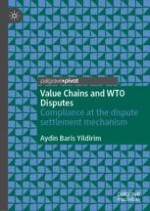2020 | OriginalPaper | Chapter
3. Explaining Patterns of WTO Member Behavior at the WTO Dispute Settlement
Author : Aydin Baris Yildirim
Published in: Value Chains and WTO Disputes
Publisher: Springer International Publishing
Activate our intelligent search to find suitable subject content or patents.
Select sections of text to find matching patents with Artificial Intelligence. powered by
Select sections of text to find additional relevant content using AI-assisted search. powered by
